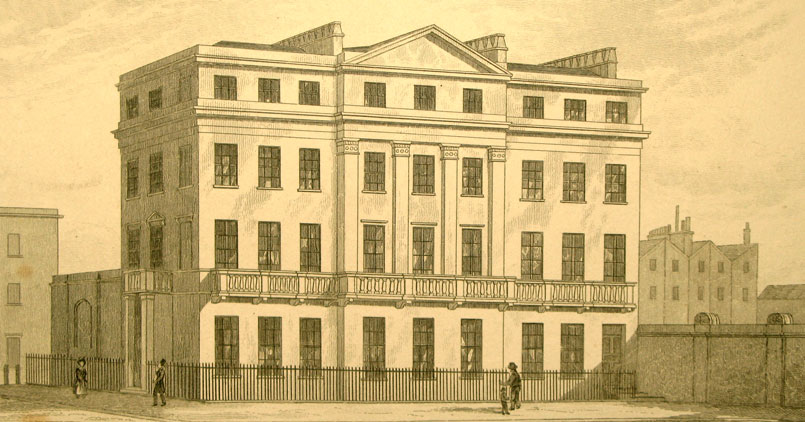The Dissenting Academies Project

Coward College (1834). Photograph Courtesy of the Trustees of Dr Williams’s Library. The building of the former Coward College in Byng Place, Bloomsbury, was adjacent to University Hall (now Dr Williams’s Library) in Gordon Square.
The academies
The earliest dissenting academies were established after the Restoration as a result of the 1662 Act of Uniformity, and were intended to provide Protestant students dissenting from the Church of England with a higher education similar to that at Oxford and Cambridge, from which they were largely excluded. Their main purpose was to prepare candidates for the ministry, but many educated lay students as well. They played a crucial role in ministerial and lay education: the tutors and the students they educated contributed in fundamental ways to the development of ideas, notably in the fields of theology, philosophy, literature, and science. In the nineteenth century the academies’ original purpose to provide a higher education was largely superseded by the founding of London and the provincial universities, which were open to dissenters, and by the eventual reform of Oxford and Cambridge.
To find out more go to Historical Information: Timeline, Protestant Dissent, and Dissenting Academies.
The need for a new history of the academies
The wealth of new research on the English and Scottish universities has not been matched by work of comparable importance on the academies. For the most part recent historians have concentrated on the late eighteenth century and on a few outstanding institutions, notably Warrington Academy. Orthodox and evangelical institutions, which educated a majority of ministers in the late eighteenth and early nineteenth centuries, have received very little attention, yet they played a key role in the extraordinary expansion in dissent during the nineteenth century. The existing literature also largely disregards links with Ireland, Scotland, continental Europe, North America, and the British Empire.
Despite considerable interest in the subject, seen particularly in work by political, educational, and literary historians, most recent studies still rely on three out-of-date books: Irene Parker, Dissenting Academies in England (1914), Herbert McLachlan, English Education Under the Test Acts (1931), and J. W. Ashley Smith, The Birth of Modern Education: The Contribution of the Dissenting Academies, 1660-1800 (1954). Some important specialist work has been published in the last thirty-five years, but there is no comprehensive modern study.
To find out more go to Historical Information: Existing Scholarship
Outcomes
The project will have two outcomes, one print and one online:
- A History of the Dissenting Academies in the British Isles, 1660-1860
(to be published by Cambridge University Press) - Dissenting Academies Online consisting of two fully searchable databases: Database and Encyclopedia and Virtual Library System.
Together these will replace the older studies and provide a comprehensive, archive-based history that will transform scholarly understanding of the importance of the Protestant dissenting academies to higher education and intellectual life in Britain and overseas for a period of two hundred years.
People
The project was set up in 2006 as a collaboration between the Dr Williams’s Centre for Dissenting Studies (Professor Isabel Rivers and Dr David Wykes) and the Sussex Centre for Intellectual History (Professors Knud Haakonssen and Richard Whatmore). It is now directed by Isabel Rivers at the Queen Mary Centre for Religion and Literature in English.
Postdoctoral Research Fellows, 2008-11, funded by the Leverhulme Trust: Dr Simon Dixon (Queen Mary) and Dr Inga Jones (Sussex).
Postdoctoral Research Fellows, 2009-11, funded by the AHRC Religion and Society Programme: Dr Rosemary Dixon and Dr Kyle Roberts (Queen Mary).
Technical Research Assistant, 2009-11, funded by the AHRC and the Leverhulme Trust: Dr Dmitri Iourinski (Queen Mary).
Research Assistants, 2012-13, funded by the AHRC: Dr Benjamin Bankhurst and Dr Rachel Eckersley (Queen Mary).
Technical Research Assistant, 2012-13, funded by the AHRC: Dr Dmitri Iourinski (Queen Mary).
AHRC CDA students, 2007-10, Dr Stephen Burley and Dr Tessa Whitehouse (Queen
Mary).
AHRC Religion and Society CDA student, 2007-10, Dr Mark Burden (Queen Mary).
Major grants awarded
The Leverhulme Trust: £247,173, for ‘A History of the Dissenting Academies in the British Isles, 1660-1860’, 2008-11 (principal investigator: Isabel Rivers; co-investigators: David Wykes, Knud Haakonssen, Richard Whatmore).
AHRC Religion and Society Programme: £366,269, for ‘Dissenting Academy Libraries and their Readers, 1720-1860’, 2009-11 (principal investigator: Isabel Rivers; project partner: David Wykes).
AHRC: £95,821 for ‘Private Books for Educational Use – the Formation of the Northern Congregational College Library’, 2012-13 (principal investigator: Isabel Rivers; project partner: David Wykes; principal consultant: Ed Potten).
In addition, the project has been awarded a number of small grants by the following bodies: AHRC Religion and Society (Workshop Grant: Knud Haakonssen); Dr Williams’s Trust, the British Academy (Small Grant), Manchester Academy Trust, Manchester Memorial Hall Trust, Congregational Memorial Hall Trust, and Pilgrim Trust (all to David Wykes).
Other Resources
Dissenting Academies Project: Tutor Biographies and Academy Histories

Leverhulme, AHRC and Religion & Society logos
